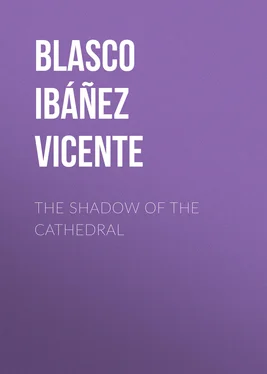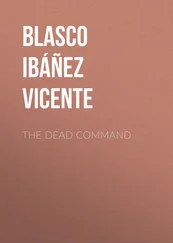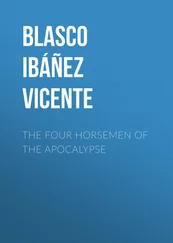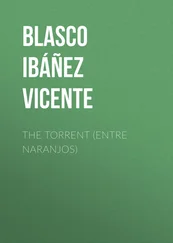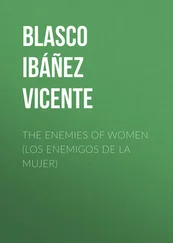Vicente Blasco Ibáñez - The Shadow of the Cathedral
Здесь есть возможность читать онлайн «Vicente Blasco Ibáñez - The Shadow of the Cathedral» — ознакомительный отрывок электронной книги совершенно бесплатно, а после прочтения отрывка купить полную версию. В некоторых случаях можно слушать аудио, скачать через торрент в формате fb2 и присутствует краткое содержание. Жанр: foreign_prose, foreign_antique, на английском языке. Описание произведения, (предисловие) а так же отзывы посетителей доступны на портале библиотеки ЛибКат.
- Название:The Shadow of the Cathedral
- Автор:
- Жанр:
- Год:неизвестен
- ISBN:нет данных
- Рейтинг книги:4 / 5. Голосов: 1
-
Избранное:Добавить в избранное
- Отзывы:
-
Ваша оценка:
- 80
- 1
- 2
- 3
- 4
- 5
The Shadow of the Cathedral: краткое содержание, описание и аннотация
Предлагаем к чтению аннотацию, описание, краткое содержание или предисловие (зависит от того, что написал сам автор книги «The Shadow of the Cathedral»). Если вы не нашли необходимую информацию о книге — напишите в комментариях, мы постараемся отыскать её.
The Shadow of the Cathedral — читать онлайн ознакомительный отрывок
Ниже представлен текст книги, разбитый по страницам. Система сохранения места последней прочитанной страницы, позволяет с удобством читать онлайн бесплатно книгу «The Shadow of the Cathedral», без необходимости каждый раз заново искать на чём Вы остановились. Поставьте закладку, и сможете в любой момент перейти на страницу, на которой закончили чтение.
Интервал:
Закладка:
The bell-ringer's son would examine the deposits dropped in the dust, and would enumerate all the different birds who took refuge in the summit of the mountains of stone: this belonged to the hooting owl, and that to the red owl, and this again to the raven, and he spoke with respect of a certain nest of eagles that his father had seen as a young man, fierce birds who had endeavoured to tear out his eyes, and who had so thoroughly frightened him that he had been obliged to borrow the gun belonging to the night watchers on each occasion that his duties took him to the roof.
Gabriel loved that strange world, harbouring above the Cathedral with its silence and its imposing solitude. It was a wilderness of wood, inhabited by strange creatures who lived unnoticed and forgotten under the roof-tree of the church. Truly the good God had a house for the faithful down below, and an immense garret above for the creatures of the air.
The savage solitude of the higher regions was a great contrast to the wealth of the chapel of the Ochava, full of relics in golden vessels and caskets of enamel and precious marbles, to the quantities of pearls and emeralds in the magnificent treasury, heaped up as though they had been peas, and to the elegant luxury of the wardrobe, full of rare and costly stuffs and vestments exquisitely embroidered with every colour of the rainbow.
Gabriel was just eighteen when he lost his father. The old gardener died quietly, happy in seeing all his family in the service of the Cathedral and the good old tradition of the Lunas continued without interruption. Thomas, the eldest son, remained in the garden, Esteban, after serving many years as acolyte and assistant to the sacristans, was Silenciario, and had been given the Wooden Staff and seven reals a day, the height of all his ambition; and as far as regarded the youngest, the good Señor Esteban had the firm conviction that he had begotten a Father of the Church, for whom a place in heaven was especially reserved at the right hand of God Omnipotent.
Gabriel had acquired in the seminary that ecclesiastic sternness that turns the priest into a warrior more intent on the interest of the Church than on the concerns of his family. For this reason he did not feel the death of his father very greatly; besides, much greater misfortunes soon occurred to preoccupy the young seminarist.
CHAPTER III
There was great excitement both in the Cathedral and in the seminary, everyone discussing from morning till night the news from Madrid, for these were the days of the September revolution. The traditional and healthy Spain, the Spain of the great historical tradition had fallen. The Cortes Constituyentes were a volcano, a breath from the infernal regions, to those gentlemen of the black cassock who crowded round the unfolded newspaper, and, if they found comfort and satisfaction in a speech of Maesterola's they would suffer the agonies of death at the revolutionary harangues, which dealt such terrible blows at the olden days. The clergy had turned their eyes towards Don Carlos, who was beginning the war in the northern provinces; the king of the Vascongados 20 20 Provinces of Alava, Guipuscoa, and the lordship of Biscay.
mountains would be able to remedy everything when he came down into the plains of Castille. But years passed by, Amadeus had come and gone, they had even proclaimed a republic! And yet the cause of God did not seem to advance much, and Heaven seemed deaf. A republican deputy proclaimed a war against God, challenging Him to silence him; and so impiety stalked along immune and triumphant, and its eloquence flowed abroad like a poisonous spring.
Gabriel lived in a state of bellicose excitement—he forgot his books, he disregarded his future, he never thought now of singing his mass. What would happen to his career now that the Church was in peril, and that the sleepy poetry of past ages, that had enveloped him from his cradle like a perfumed cloud of old incense and dried roses, was on the point of vanishing?
Often some of the pupils disappeared from the seminary, and the professors would reply to the inquiries of the curious with a sly wink.
"They have gone out—with the good sort. They could not see quietly what was happening—'child's play,' 'follies.'"
But nevertheless such follies made them smile with paternal satisfaction.
He thought to be himself among those who fled, as the world seemed to be coming to an end. In certain towns the revolutionary mob had invaded and profaned the churches; as yet they had not murdered any of the ministers of God as in other revolutions, but still the priests were unable to go about the streets in their cassocks for fear of being hooted and insulted. The remembrance of the archbishops of Toledo, those brave ecclesiastical princes, implacable warriors against the infidels, fired his warlike feelings. As yet he had never been away from Toledo, away from the shadow of its Cathedral; Spain seemed to him as vast as all the rest of the world put together, and he began to feel the ardent desire of seeing something new, of seeing closer all the wonderful things he had read about in his books, stirring within him.
One day he kissed his mother's hand, without feeling any very great emotion towards the trembling and nearly blind old woman, for the seminary had for him more tender memories than the house of his fathers, smoked his last cigar with his brothers in the garden without revealing his intentions to them, and that night he fled from Toledo with a scapulary of the Heart of Jesus sewed into his waistcoat, and a beautiful silk scarf in his wallet, one of those worked by white hands in the convents of the city. The son of the bell-ringer went with him. They joined one of the insignificant bands who were devastating Murcia, but they soon went on to Valencia and Catalonia, anxious to perform greater exploits for the cause of God than merely stealing mules and extorting contributions from the rich.
Gabriel felt an intense delight in this wandering life, with its continual alarms owing to the proximity of the troops.
He had been made an officer at once, on account of his education, and because of the letters of recommendation that certain of the prebends of the Metropolitan Church had given him; letters lamenting greatly that a youth of so much theological promise should go and risk his life like a simple sacristan.
Luna enjoyed the free and lawless life of war with the zest of a collegian out of bounds; but he could not hide the feeling of painful disillusion that the sight of those armies of the Faith caused him. He had expected to find something akin to the ancient crusading expeditions: soldiers who fought for an ideal, who bent the knee before beginning the fight, so that God might be on their side, and who at night, after a hard-fought field, slept the pure sleep of an ascetic; instead of which he found an armed mob, mutinous to their leaders, incapable of that fanaticism which rushes blindfold to death, anxious only that the war might last as long as possible, so that they might continue the life of lawless wandering at the expense of the country, which they considered the best life possible; people who at the sight of wine, women or plunder would disband themselves, hungering, turning against their leaders.
It was the ancient life of the horde, surging up through civilisation, the atavic custom of stealing the stranger's bread and women by force of arms, the ancient Celtiberic love of factions and internal strife, that only caught hold of a political pretext in order to revive.
Gabriel, with very rare exceptions, found none in those badly-armed and worse-clothed bands who fought with a fixed idea; they were adventurers who wished for war for the sake of war; visionaries anxious for fortune; country lads from the fields, who in their passive ignorance had joined the factions, just as they would have stayed at home if they had had better counsels; simple souls who firmly believed that in the towns they were burning and destroying God's ministers, and who had thrown themselves into the fray so that society should not lapse into barbarism.
Читать дальшеИнтервал:
Закладка:
Похожие книги на «The Shadow of the Cathedral»
Представляем Вашему вниманию похожие книги на «The Shadow of the Cathedral» списком для выбора. Мы отобрали схожую по названию и смыслу литературу в надежде предоставить читателям больше вариантов отыскать новые, интересные, ещё непрочитанные произведения.
Обсуждение, отзывы о книге «The Shadow of the Cathedral» и просто собственные мнения читателей. Оставьте ваши комментарии, напишите, что Вы думаете о произведении, его смысле или главных героях. Укажите что конкретно понравилось, а что нет, и почему Вы так считаете.
